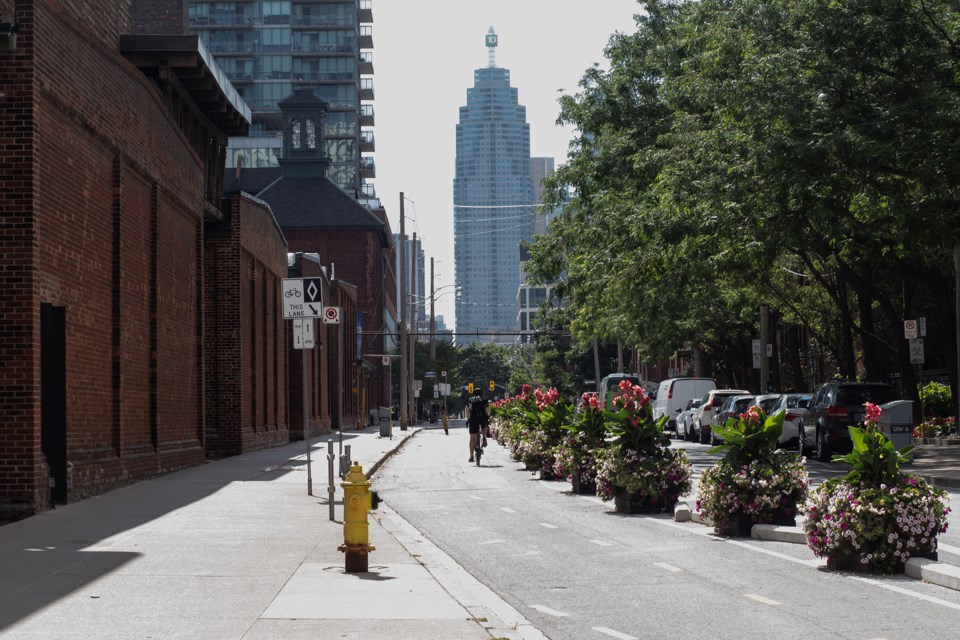EDITOR’S NOTE: This article originally appeared on The Trillium, a Village Media website devoted exclusively to covering provincial politics at Queen’s Park
Transportation Minister Prabmeet Sarkaria isn't ruling out tearing up existing bike lanes as part of the province's plan to restrict where cities put them.
"As of right now," the lanes are staying, he said Tuesday when explicitly asked whether lanes will be removed. But he announced that the province will be requesting data from cities on bike lanes installed within the last five years so that he can decide whether or not they should remain.
It was part of Sarkaria's official announcement that cities will, once legislation to be tabled this fall passes, have to seek provincial approval for bike lanes that take away lanes for cars, and that cities will have to prove they will not have a "negative impact on vehicle traffic."
The move brings "informed decision-making and oversight to a process that is frankly out of control," Sarkaria said.
The new legislation will be introduced next Monday, when MPPs return to Queen's Park after an extended summer break. It could be one of the last legislative sittings before the Tories call a snap election next year, and the new bill is expected to appeal to the party's suburban voter base, who largely rely on cars for transit.
The legislation has already been widely reported on, including by The Trillium, after CBC first broke the news the government was considering taking such a step in September.
Toronto Mayor Olivia Chow was quick to voice opposition.
"I do not support limiting city powers. It’s always better when we work together to get things right,” Chow said. The province should focus on their job of finally getting the Eglinton Crosstown and Finch LRT open, which will have a huge impact on congestion in our city.”
"As the province's largest municipality, Toronto also needs our share of money to repair our aging roads and potholes to keep people moving,” she added.
Sarkaria did not offer any details on what his bike-lane decision-making process would involve, saying only that the final call would come from his office.
His ministry could not define what a "negative impact on vehicle traffic" means in this context by filing deadline.
The City of Toronto has published several studies on expanded bike lanes that show they have a small impact on car commute times and next to no impact on emergency response times.
In 2016, the city installed new bike lanes on Bloor Street between Shaw Street and Avenue Road.
As a result, biking went up by 50 per cent and "conflicts" between bikes and cars — which include near-miss collisions — went down by 61 per cent, according to a city study. Spending at local businesses also increased.
Travel times went up by as much as eight minutes after the lanes were installed, but traffic mitigation efforts cut the increases in half.
Similar findings were drawn from a study on the Yonge Street bike lanes between Bloor Street and Davisville Avenue conducted in fall 2022.
During morning rush hour, vehicle travel times increased by 20 seconds northbound and decreased by 30 seconds southbound. During the afternoon rush, car travel times were up by about 50 seconds both ways.
The same study found emergency response times went up eight seconds for the fire department compared to the city-wide average, while ambulance response times increased by 36 seconds less than the citywide average.
On University Avenue, right by Queen's Park and home to many hospitals, another 12-month city evaluation found bike lanes had "limited to no impacts on motor vehicle travel times," according to a Toronto spokesperson.
Emergency services have also "not raised any issues about traffic" related to bike lanes along the corridor, the spokesperson said.
The crackdown comes at a time when Premier Doug Ford and other Progressive Conservative MPPs have been voicing opposition to new bike lanes that have been extended into Etobicoke, the heart of Ford Nation.
Late last year, the premier went off-script at a press conference in Milton to chide Chow for building more bike lanes.
"Get rid of those bike lanes on Bloor in Etobicoke. I think we see one bicycle come through there every single year," he said.
The NDP and Green parties were quick to denounce the move.
"The answer to congestion is not steamrolling municipalities and fantasy tunnels, it is building transit, opening up the 407 for trucks and freight, freeing up the 401, so people can get home to their loved ones. Pitting road users against one another will only make things worse. This is nonsense from a government that has clearly run out of ideas," said NDP transportation critic Joel Harden.
On Tuesday, Green Party Deputy Leader Aislinn Clancy said the announcement "is just a distraction from a government that doesn’t have a serious solution to deal with gridlock."
"What about the mountains of evidence collected by municipalities and the province itself showing that bike infrastructure does not make traffic worse?" Clancy asked. "If we want to solve our traffic problems, we need to give people more choices – not take them away.
